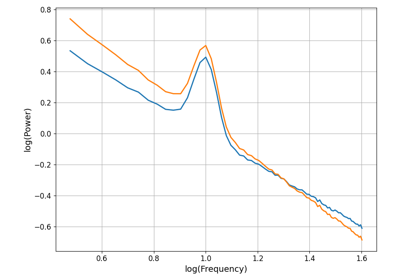fooof.sim.transform.compute_rotation_frequency¶
- fooof.sim.transform.compute_rotation_frequency(delta_exponent_b, f_rotation_b, delta_exponent_c, f_rotation_c)[source]¶
Calculate the rotation frequency between two rotated power spectra.
- Parameters:
- delta_exponent_bfloat
The applied change in exponent value for power spectrum ‘B’.
- f_rotation_bfloat
The rotation frequency applied to power spectrum ‘B’.
- delta_exponent_cfloat
The applied change in exponent value for power spectrum ‘C’.
- f_rotation_cfloat
The rotation frequency applied to power spectrum ‘C’.
- Returns:
- float
The frequency rotation point between spectra ‘B’ & ‘C’.
Notes
Code Notes
This computes the rotation frequency for two power spectra ‘B’ & ‘C’, under the assumption that they are both rotated versions of a the same original power spectrum ‘A’.
Derivation
Given an original power spectrum A, then:
B = A*(f_rotation_b/freqs)^delta_exponent_b
C = A*(f_rotation_c/freqs)^delta_exponent_c
Therefore, what you want is f_rotation_bc, which is the frequency where B==C.
To find this, we can plug everything back into the equation, to find where B[freqs] == C[freqs], which is how we arrive at the solution below.
Examples
Calculate the rotation frequency between two transformed power spectra:
>>> f_rotation = compute_rotation_frequency(0.5, 25, -0.25, 10)
